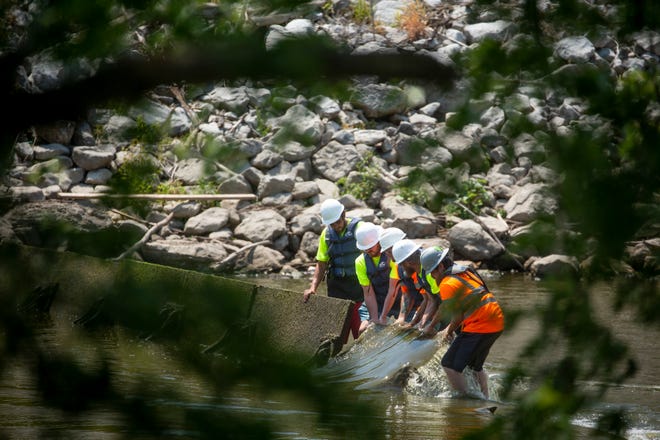Drought forces Des Moines Water Works to raise Raccoon River flashboards for third year
 Donnelle Eller
Donnelle Eller
Faced with an unrelenting drought, Des Moines Water Works is raising its flashboards on the Raccoon River to boost the amount of water it’s able to collect.
It’s the third year in a row the Des Moines has been forced to use the large metal gates to raise water levels around the intake for its Fleur Drive treatment plant. The Raccoon River is about 83% below its normal levels, the utility said.
In July, Des Moines received 2.32 inches of rain, 1.5 inches below normal, said Alexis Jimenez, a National Weather Service meteorologist in Johnston.
Some relief could be coming: After three weeks with only a few hundredths of an inch of rain, the metro received 0.6 inches overnight Wednesday. And large parts of Iowa could see much-needed rain Friday and Saturday, Jimenez said.
Much more rain is needed, though, she said. Statewide, precipitation in July totaled 3.1 inches, 1.07 inches below normal, according to state officials. Since May, Iowa has received a total of 8.66 inches, 12.85 inches below normal.
Polk County is experiencing abnormally dry to moderate drought conditions, according to the U.S. Drought Monitor, which will be updated Thursday. About 83% of Iowa is experiencing moderate to extreme drought conditions.
The U.S. Department of Agriculture said it is allowing emergency haying and livestock grazing on conservation reserve acres in 46 counties due to the drought conditions.
Iowa has experienced some level of drought for three years, the longest stretch in the U.S. Drought Monitor’s 23 year of tracking, Justin Glisan, the state’s climatologist, said last month.
More:Farmers hope recent rains will ease Iowa's drought, now in the longest stretch in 23 years
Crop conditions deteriorated last week: Iowa corn acres considered in good to excellent condition dropped to 59% from 63% last week, the USDA reported Monday, and soybeans fell to 55% from 58%.
In addition to 2021, 2022 and this year, Des Moines Water Works said it also erected the flashboards on the Raccoon River in 2012 and 2013, two other years of extreme drought.
The utility struggles with algae blooms during the summer, especially on the Des Moines River, another source of drinking water. The algae, potentially harmful to people and animals, can make the water difficult to treat.
The utility isn't requesting conservation efforts beyond using water wisely and spreading out demand by following a volunteer lawn watering schedule that calls for people with even-numbered addresses to water only on Sundays, Wednesdays and Fridays and those with odd-number addresses to water on Tuesdays, Thursdays and Saturdays. The schedule calls on all to abstain from watering on Mondays.
Kayakers and canoeists on the Raccoon River near the Water Works plant will need to use the portage trail around the flashboards, the utility said.
Donnelle Eller covers agriculture, the environment and energy for the Register. Reach her at deller@registermedia.com or 515-284-8457.